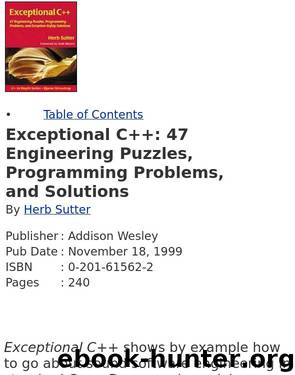Addison Wesley: Exceptional C++: 47 Engineering Puzzles, Programming Problems, and Solutions by Herb Sutter

Author:Herb Sutter
Language: eng
Format: epub
ISBN: 0-201-61562-2
Publisher: Addison Wesley
Never use public inheritance to implement "IS-ALMOST-A." I've seen some programmers, even experienced ones, inherit publicly from a base and implement "most" of the overridden virtual functions in a way that preserved the semantics of the base class. In other words, in some cases using the Derived object as a Base would not behave quite the way that a reasonable Base client could expect. An example often cited by Robert Martin is the usually misguided idea of inheriting a Square class from a Rectangle class "because a square is a rectangle." That may be true in mathematics, but it's not necessarily true in classes. For example, say that the Rectangle class has a virtual SetWidth(int) function. Then Square's implementation to set the width would also naturally set the height so that the object remains square. Yet there may well exist code elsewhere in the system that works polymorphically with Rectangle objects, and would not expect that changing the width would also change the height. After all, that's not true of Rectangles in general! This is a good example of public inheritance that would violate LSP, because the derived class does not deliver the same semantics as the base class. It violates the key precept of public inheritance: "Require no more and promise no less."
Download
This site does not store any files on its server. We only index and link to content provided by other sites. Please contact the content providers to delete copyright contents if any and email us, we'll remove relevant links or contents immediately.
The Mikado Method by Ola Ellnestam Daniel Brolund(21397)
Hello! Python by Anthony Briggs(20651)
Secrets of the JavaScript Ninja by John Resig Bear Bibeault(19079)
Dependency Injection in .NET by Mark Seemann(18736)
The Well-Grounded Java Developer by Benjamin J. Evans Martijn Verburg(18323)
Kotlin in Action by Dmitry Jemerov(18074)
OCA Java SE 8 Programmer I Certification Guide by Mala Gupta(17998)
Adobe Camera Raw For Digital Photographers Only by Rob Sheppard(16942)
Algorithms of the Intelligent Web by Haralambos Marmanis;Dmitry Babenko(16833)
Grails in Action by Glen Smith Peter Ledbrook(15971)
Test-Driven iOS Development with Swift 4 by Dominik Hauser(10591)
Becoming a Dynamics 365 Finance and Supply Chain Solution Architect by Brent Dawson(8059)
Microservices with Go by Alexander Shuiskov(7824)
Practical Design Patterns for Java Developers by Miroslav Wengner(7725)
Test Automation Engineering Handbook by Manikandan Sambamurthy(7678)
Angular Projects - Third Edition by Aristeidis Bampakos(7169)
The Art of Crafting User Stories by The Art of Crafting User Stories(6614)
NetSuite for Consultants - Second Edition by Peter Ries(6538)
Demystifying Cryptography with OpenSSL 3.0 by Alexei Khlebnikov(6309)
